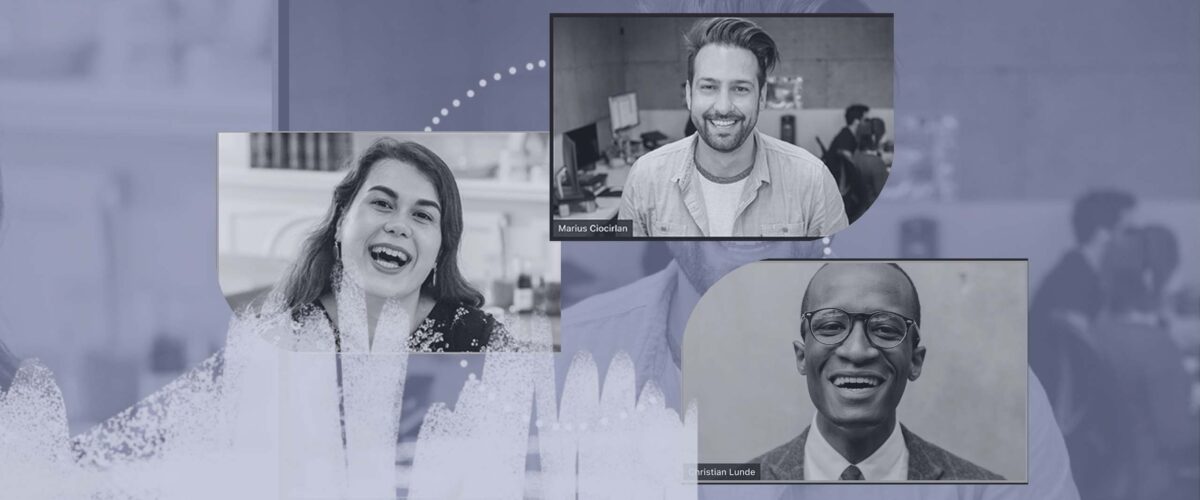How a seamless, transparent, and equitable candidate experience can create a distinct competitive advantage and turn your company into a destination employer.
The modern workforce has completely transformed the hiring landscape: historically reliable talent acquisition strategies just aren’t cutting it anymore.
In previous years, companies with deep pockets, experienced recruiters, and great reviews seemed to always snatch up the best talent. But today’s job seekers aren’t evaluating their potential employers as they did before—and in a candidate’s market, employers need to adapt to candidates’ changing expectations of their employers and interview experiences. Job seekers now pay close attention to organizations’ missions, values, and culture to find an organization that resonates with them on a meaningful level.
As a direct result, the hiring market is saturated with job descriptions that try to entice candidates with colorful messaging about how they work on innovative projects in an exciting, fast-paced work environment that rewards accomplishment and initiative. But as one job post blends into another, businesses must seek out new strategies to stand out from the crowd.
Organizations can gain a competitive advantage by enhancing their candidate experience through an increased focus on improving the interviewing process.
UP NEXT- CHAPTER 1: THE OLD WAY
Traditional candidate experiences don’t match up with the needs of the modern job seeker
In a traditional hiring model, organizations focus on boosting their employer brand with career pages, in-person hiring events, Glassdoor reviews, and other employer-centric initiatives…
CHAPTER 1: THE OLD WAY
Traditional candidate experiences don’t match up with the needs of the modern job seeker
In a traditional hiring model, organizations focus on boosting their employer brand with career pages, in-person hiring events, Glassdoor reviews, and other employer-centric initiatives. The problem with this system is that it neglects to nurture the overall candidate experience in an increasingly digital age.
Applicants are trapped in an environment that forces them to play by the employer’s rules, where they must sacrifice work hours to travel to far-away offices for interviews that often prioritize the employer’s needs with little regard to the candidate’s values.
Here are some areas where the candidate experience needs to be improved, and why.
Candidate profiles and preferences have drastically changed
Millennial and Generation Z workers now make up the majority of the growing workforce. With them they bring fresh viewpoints on the workplace in general, including that professional relationships can be built in remote work environments. But it’s not just the new kids on the block who are shaking things up: the workplace digitization resulting from COVID-19 has convinced workers of all generations that professional relationships can be built remotely.
The issue here isn’t that candidate preferences have shifted, but that employers’ responses have not adapted. Many companies are attempting to “put a square peg into a round hole” and force applicants to adhere to their rules and processes, rather than listen to the trends that show hiring is now more online than ever before.
“A new currency of social capital is emerging, and employers who are meeting early talent where they are will be best positioned to cash in.”3 —Garrett Lord, Co-Founder of Handshake & Lindsey Pollak, New York Times best-selling author and career expert
Another notable generational preference is the use of technology in the workplace. A whopping 80%4 of Generation Z aspires to work with cutting-edge technology. They value workplace enhancements like tech mobility, personal data privacy, and to use newer software features such as voice recognition, virtual assistants, and augmented reality tools.
Screening is standardized and employer-centric
Candidates are job-seeking for one of a few reasons: they were let go, they are dissatisfied with their current position, or they are interested in something new. But despite the unique situation of each candidate, they face the same hiring process in a series of dozens, if not hundreds, of organizations.
This process makes candidates feel like they’re just another faceless application being run through a corporate assembly line, and their overall candidate experience becomes mind-numbing and repetitive even before they’ve had a chance to meet a company’s hiring manager for an interview. What’s worse, this makes it difficult for candidates to see the benefits of why they should choose one business over others.
Interviews are out of touch with candidate expectations
Interview questions are often not designed to sufficiently determine if the skills, values, and personal preferences of the interview candidate are a match for the job and employer. Interviewing should be a two-way process that provides candidates with the opportunity to see if the company and its culture would be a good fit for them—particularly when it comes to work-life balance.
Traditional interview questions generally give an upper hand to the employer in the power dynamic by focusing on what the candidate has to offer, not the other way around. Candidates need a fair and consistent interview process that gives them time to ask questions so they can determine whether the position and the company are a good fit for them.
Interview questions aren’t aligned with organizational priorities
Particularly in larger organizations, there is often a disconnect in the questions that are asked between a recruiter, hiring manager, and others involved in the process. This not only makes it challenging to gain a complete view of the candidate for smart hiring decisions, it also extends the overall time-to-hire.
The longer it takes a candidate to progress through the hiring process, the more likely it is that a candidate will accept a position with another employer—or that the organization will have internal miscommunications that can be embarrassing and even lead to candidates being accidentally “ghosted.”
When recruiters and hiring managers start to feel the pressure of potentially losing the interest of their best candidates, the recruitment process shifts into high-gear to fill positions quickly. This increases the risk of a poor hiring decision, and can ultimately result in additional recruitment costs and less productivity.
Unclear expectations of the interview process
An unclear interview journey that seems to go on indefinitely with no end in sight creates a terrible experience for the candidate in one of the most crucial stages of the hiring process. Candidates may wash out and seek other opportunities because of that experience, even if they’re offered the position.
Inadequate interviewer preparedness and transparency
A major source of frustration for many job seekers is when they put time and effort into preparing for their interview, but it’s obvious that the interviewer hasn’t shown them the same respect.
An unprepared interviewer may ask questions that—at best—are disorganized and unproductive, or—at worst—are downright illegal.
What do unethical interview questions look like?
- How old are you?
- Do you have children?
- Are you married?
- Do you have a disability?
- Where did you grow up?
- What church do you go to?
- Were you honorably discharged from the military?
Unprepared questions leave room for interviewers to demonstrate unconscious bias, a concept that can leak out into all stages of an applicant’s review process. Not only is this unethical and unfair to candidates, but it limits the ability of hiring managers to increase diversity within their organizations.
Unethical questions can extend to worse levels of inappropriateness, sometimes crossing legal lines, which introduces significant compliance liability risks.
2020 U.S. Equal Employment Opportunity Commission (EEOC) Charges
| EEOC Violation Basis | Charges Filed | Monetary Benefits |
| Gender | 21,398 | $153 million |
| Disability | 24,324 | $116 million* |
| Race | 22,064 | $75 million |
| Age | 14,183 | $76 million |
| National Origin | 6,377 | $26 million |
| Religion | 2,404 | $6 million |
| LGBTQ+ | 1,857 | $6 million |
*2019 data provided; 2020 data not available
CHAPTER 2: THE MODERN WAY
Gaining a competitive edge by delivering exceptional candidate experiences
Clearly, the traditional interview process is not sufficient for modern business hiring needs. Relying on obsolete interviewing philosophies and methods that don’t align with the current job seeking landscape causes missed opportunities to connect with talented individuals who might have proven profitable additions to their teams.
An exceptional candidate experience features five primary factors: accessibility, fairness and equitability, consistency, efficiency, and transparency.
The makings of an exceptional candidate experience
- Accessibility: candidates can use the software that they are already comfortable with
- Fairness and equitability: the same is asked of each candidate
- Consistency: clear, consistent communication informs candidates of what to expect
- Efficiency: entire process is handled within a reasonable amount of time
- Transparency: candidates are kept informed of any delays, setbacks, or decisions
By prioritizing the candidate experience, particularly throughout the interview process, any organization can benefit from several critical advantages.
Attract top-quality applicants
Simply put: the better candidate experience you offer, the greater the supply of qualified candidates that will be interested in your open job positions.
Candidates priorities
- Companies lose as many as 89% of potential candidates due to prolonged screening process13
- 76% of job seekers report a diverse workplace as an important factor in evaluating companies14
- 75% of job seekers are likely to apply to a job if the employer actively manages its employer brand15
Expedite the hiring process and reduce recruiting costs
Using the right collaboration and coordination tools can streamline your hiring process and give you an edge over the competition. The average time-to-hire is between three to four weeks across all industries16, largely due to lengthy interview processes and inefficient internal communications.
Worse, the cost of recruitment throughout all industries and job types has consistently trended upward. In fact, between January and August 2021, the cost-per-click increased by 41.25% and the cost-per-application increased by nearly 28%.17
How are recruiters spending their time
- Recruiters spend an average of ⅔ of their overall hiring time on the interview process, with 67% spending between 30 minutes and 2 hours just to schedule a single interview18
- The average length of the job interview process is between 21 to 23 days19
- 60% of recruiters say that candidate screening takes the most time in the hiring process20
Effectively managing the candidate experience—slashing the number of steps in the process, aligning interview experiences with both personal and organization objectives, and remaining in constant communication throughout the process—can greatly increase the number of qualified job seekers submitting applications, which reduces recruitment costs by lowering average costs per application down.
Create a more inclusive and diverse workforce
Organizations that create cultures of inclusiveness reap the benefits of high employee retention, with one study showing that inclusive work cultures have 22%22 lower turnover rates compared to non-inclusive workplaces. There’s also the added financial value of practicing diversity, equity, and inclusion, which includes higher revenues and above-average returns on their human capital investments.
Positives of the diversity, equity, and inclusion work culture
- Highly inclusive organizations generate 1.4 times more revenue and are 120% more capable of meeting financial targets23
- Racially/ethnically diverse companies were 35% more likely to have financial returns above their industry average24
- More than 3 out of 4 job seekers and employees (76%) report that a diverse workforce is an important factor when evaluating companies and job offers25
Diversity and inclusion makes your organization particularly attractive to Millennial and Generation Z employees, who now make up close to half of the total workforce and are the driving force behind the increased emphasis on workplace fairness, transparency, and inclusion.
83% of Gen Z candidates26 feel a company’s commitment to diversity and inclusion is important when choosing an employer
47% of millennials27 view diversity as a priority for choosing employment
Reduce turnover with happier employees who are in it for the long-haul
A positive experience during the hiring process paves the way for the work culture that follows, as it shows an organization’s commitment to self-accountability, inclusivity, and celebrating achievement. Those who offer great candidate experience even see better employee retention, longevity, and performance.
How candidate experience helps employer relationships
- 15% of candidates with a positive experience put more effort into their job performance28
- Applicants satisfied with the candidate experience are more than twice as likely to recommend the hiring organization to others than those who were not satisfied29
Make your organization a place candidates want to work
Consistently delivering a great candidate experience creates a memorable and positive job-hunting experience that they’ll want to share with friends and colleagues. As word spreads, your brand becomes a destination for eager job seekers, enhancing your company’s prestige in the hiring market and producing additional benefits like job candidates actually becoming customers, whether they got the job or not.
How a candidate experience impacts your brand
- 81% of candidates will share a positive experience with their network30
- 51% of candidates share their positive experience online31
- 60% of job seekers will not purchase from the employer if they had a negative candidate experience32
- 91% of employers say that candidate experience impacts consumer purchasing decisions33
- Candidates satisfied with their experience are twice as likely to become customers of the hiring organization compared to unsatisfied candidates34
CHAPTER 3
Transforming the candidate experience with next-gen, AI-powered interview intelligence solutions
Interview intelligence solutions can help you transform your candidate experience by focusing on making interviewing fair and consistent, streamlining your hiring process. These tools are built to give your business a competitive advantage within the talent-recruiting space through advanced insights, a commitment to diversity and inclusion, and a better interview experience for both interviewers and interviewees.
Integration with popular tools
Using an interview intelligence platform that integrates with the tools your candidates already know how to use—such as Zoom and Microsoft Teams—enables you to seamlessly add a new system that will improve your candidate experience. The integration process is easy, reliable, and organizations can ensure it will meet their enterprise needs while also keeping their data secure.
Advanced interview management features
AI-powered software organizes important candidate information and provides guided interview questions. These questions span I/O approved skills and competencies to help evaluate whether the candidate is qualified for the job and if the candidate is a good fit for the organization. The questions are structured to ensure that an equitable and consistent interview experience will be given to all candidates.
Furthermore, interview-recording features provide organizations with the ability to provide personalized interviewer coaching and enhance their interview skills.
Real-time insights
Through the video recording features, you can capture key moments during the interview and grasp various candidate sentiments. Internal candidate ratings are also viewable for all members of the hiring team to help you make direct and fair evaluations.
Multi-channel collaboration capabilities
Collaboration tools enable more team members to be involved in the hiring process without compromising critical time. Thanks to the interview recordings and transcripts, each team member can get a comprehensive understanding of each candidate to allow a more evidence-based hiring decision.
Interview coaching can also be done with ease through much of the information collected. The training tools available provide a new level of preparedness and knowledge to your interviewers to enhance the overall candidate experience.
CHAPTER 4
A new era of candidate experience management
As the entire hiring process continues to evolve, employers are looking for new ways to set themselves apart from competing candidate seekers. Branding campaigns, soliciting Glassdoor reviews, and creating culture pages on their website are just not enough for today’s workforce to make full-scale career commitments. This means there is ample opportunity to separate yourself from those living in the past by investing in the right technology that enhances candidate experience from application to job offer.
Clovers is leading the charge in helping enterprises create more impactful and memorable interview experiences that lead to the right hire, every time. The Clovers Interview Intelligence Platform delivers a comprehensive suite of intuitive, integrated tools like real-time feedback and candidate sentiments, candidate scoring, interview recordings, and customizable I/O and culture-based questions to boost efficiency during interviews and post-interview evaluations.
More importantly, the tools enable hiring teams to foster a more collaborative and seamless effort among themselves and create a more inclusive, transparent, and equitable experience for candidates.
In an age when job candidates have more options, more leverage, and greater expectations of their careers than ever, Clovers provides enterprise recruiting teams with everything they need to bolster their reputation as a desirable employer, provide an unrivaled candidate experience, and sprint to the front of the line in the race for top talent.
The competitive advantage obtained from quality personnel that are also solid cultural fits brings about bottom line benefits like decreased recruiting costs, higher revenues, and an amplified brand image.
Talk to one of our sales representatives to see how the Clovers Interview Intelligence Platform can help your organization create an exceptional and productive interview experience for candidates and keep you one step ahead of the competition. Or, Try for free for 30 days
- 2021 Future of Recruiting Study. CareerArc.com. Dec. 14th, 2020
- The New Currency of Social Capital. JoinHandShake.com.
- Lord, Garrett. Pollak, Lindsey. Gen Z and the Death of the Networking Mixer. QZ.com. Nov. 15th, 2021
- O’Brian, Megan. What Gen Z Looks for in the Workplace and How to Provide It. Netsuite.com. Jun. 28th, 2021
- O’Brian, Megan. What Gen Z Looks for in the Workplace and How to Provide It. Netsuite.com. Jun. 28th, 2021
- 2021 Future of Recruiting Study. CareerArc.com. Dec. 14th, 2020
- Echevarria, Desiree. 2021 Candidate Experience Report. CareerPlug.com. Sept. 27th, 2021
- 2020 Interview Scheduling Statistics and Trends. Yello.com. Sept. 19th, 2019
- The Cost of a Bad Hire and Red Flags to Avoid. ApolloTechnical.com. Sept. 16th, 2021
- Echevarria, Desiree. 2021 Candidate Experience Report. CareerPlug.com. Sept. 27th, 2021
- Maurer, Roy. 2021 Recruiting Trends Shaped by the Pandemic. SHRM.org. Feb. 1st, 2021
- U.S. Equal Employment Opportunity Commission. Discrimination by Type. EEOC.gov/discrimination-type. Dec. 30th, 2021.
- Mara, Calvello, 62 Recruitment Statistics Every HR Professional Needs to Know. G2.com. Nov. 19th, 2020
- Glassdoor’s Diversity and Inclusion Survey. Glassdoor.com. Sept. 29th, 2020
- 9 Signs of a Good Employer Brand. Glassdoor.com. Mar. 15th, 2021
- 2020 Interview Scheduling Statistics and Trends. Yello.com. Sept. 19th, 2019
- 2021 Recruitment Marketing Benchmark Report. Appcast.com. 2021
- 2020 Interview Scheduling Statistics and Trends. Yello.com. Sept. 19th, 2019
- Lazic, Marija. 30 Mind-Blowing Interview Statistics to Get You Going in 2021. Legaljobs.io. Feb. 1st, 2021
- 2020 Interview Scheduling Statistics and Trends. Yello.com. Sept. 19th, 2019
- Johnson-Hess, Abigail. 70% of Job Seekers Lose Interest in a Job if They Don’t Hear Back Just One Week After an Interview. CNBC.com Jan. 25th, 2019
- Anderson-Finch, Shannon. Patterson, Nicole. Inclusive Mobility: How Mobilizing a Diverse Workforce Can Drive Business Performance. Deloitte.com. 2018
- Bersin, Josh. Why Diversity and Inclusion Has Become a Business Priority. JoshBersin.com. Mar. 16th, 2019
- Hunt, Vivian. Layton, Dennis. Prince, Sara. Diversity Matters. McKinsey.com. Feb. 2nd, 2015
- What Job Seekers Really Think About Your Diversity and Inclusion Stats. Glassdoor.com. Jul. 12th, 2021
- What Workforce Diversity Means for Gen Z. Monster.com. 2020
- Here’s Why Millenials Want More Diverse Workplaces. Kudos.com.
- 12 Recruiting Statistics That Will Change the Way You Hire. OfficeVibe.com. Apr. 27th, 2017
- Zhang, Haiyan, Ph.D. Feinzig, Sheri, Ph.D. The Far-Reaching Impact of Candidate Experience. IBM.com. Feb. 2017
- Everything You Need to Know About Candidate Experience. Hiring.Workopolis.com. Jul. 5th, 2017
- Everything You Need to Know About Candidate Experience. Hiring.Workopolis.com. Jul. 5th, 2017
- Kandefer, Kate. 50 Recruitment Stats HR Pros Must Know in 2017. DevSkiller.com. Jan. 14th, 2017
- Tallulah, David. 23 Surprising Stats on the Future of Recruitment. CareerArc.com. Apr. 4th, 2017
- Zhang, Haiyan, Ph.D. Feinzig, Sheri, Ph.D. The Far-Reaching Impact of Candidate Experience. IBM.com. Feb. 2017







